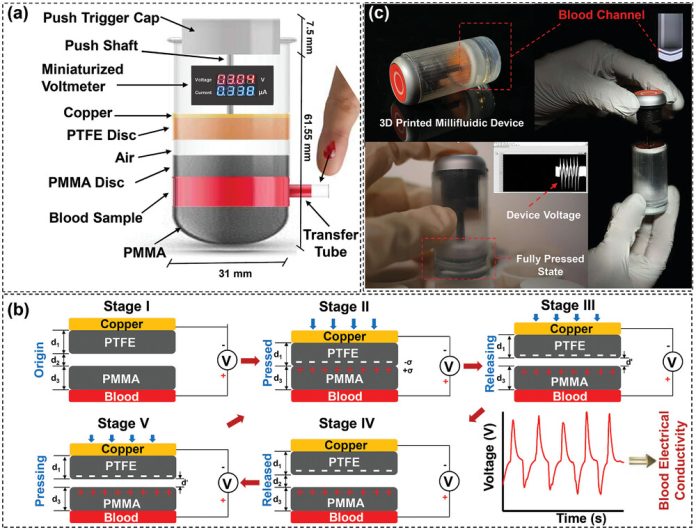
Metabolic disorders like diabetes and osteoporosis are on the rise worldwide, particularly in developing countries.
Diagnosing these disorders typically requires blood tests, but many remote areas lack the necessary healthcare infrastructure to support these tests.
Conventional methods are often labor-intensive, invasive, and time-consuming, making real-time monitoring challenging, especially in rural populations.
Researchers at the University of Pittsburgh and the University of Pittsburgh Medical Center have developed a groundbreaking device that uses blood to generate electricity and measure its conductivity.
This innovation could revolutionize medical care in remote locations.
Their research, titled “Millifluidic Nanogenerator Lab-on-a-Chip Device for Blood Electrical Conductivity Monitoring at Low Frequency,” was published in Advanced Materials.
“As nanotechnology and microfluidics advance, there’s a growing opportunity to create lab-on-a-chip devices that overcome the limitations of modern medical care,” said Amir Alavi, assistant professor of civil and environmental engineering at Pitt’s Swanson School of Engineering.
“These technologies could transform healthcare by offering quick and convenient diagnostics, ultimately improving patient outcomes and the effectiveness of medical services.”
Blood electrical conductivity is crucial for assessing various health parameters and detecting medical conditions.
This conductivity is mainly influenced by the concentration of essential electrolytes like sodium and chloride ions, which play vital roles in many physiological processes, helping doctors make accurate diagnoses.
“Blood is essentially a water-based environment with various molecules that conduct or impede electric currents,” explained Dr. Alan Wells, medical director of UPMC Clinical Laboratories. “For example, glucose is an electrical conductor. By measuring how it affects conductivity, we can make on-the-spot diagnoses.”
Understanding blood conductivity is limited by challenges like electrode polarization, limited access to human blood samples, and maintaining blood temperature.
Measuring conductivity at frequencies below 100 Hz is particularly important for understanding blood electrical properties and fundamental biological processes, but it’s also more difficult.
The research team has developed a portable, millifluidic nanogenerator lab-on-a-chip device that measures blood at low frequencies. This device uses blood as a conductive substance within an integrated triboelectric nanogenerator (TENG), converting mechanical energy into electricity through triboelectrification.
This process involves the exchange of electrons between contacting materials, creating a charge transfer. The TENG system generates a voltage difference that drives electric current when the materials move relative to each other, such as through compression or sliding.
The team analyzes the voltage generated by the device under specific conditions to determine the blood’s electrical conductivity. The self-powering mechanism allows for miniaturization of the blood-based nanogenerator.
The team also used AI models to estimate blood electrical conductivity directly from the voltage patterns generated by the device.
To test the device’s accuracy, the researchers compared its results with traditional tests, and the new method proved successful. This opens the possibility of conducting tests where people live, without needing a full lab setup.
Additionally, blood-powered nanogenerators can function inside the body wherever blood is present, enabling self-powered diagnostics using local blood chemistry.
This innovative device holds great promise for providing real-time health monitoring, particularly in remote and underserved areas, potentially transforming global healthcare by making diagnostics more accessible and efficient.
If you care about health, please read studies about how Mediterranean diet could protect your brain health, and the best time to take vitamins to prevent heart disease.
For more health information, please see recent studies that olive oil may help you live longer, and vitamin D could help lower the risk of autoimmune diseases.



